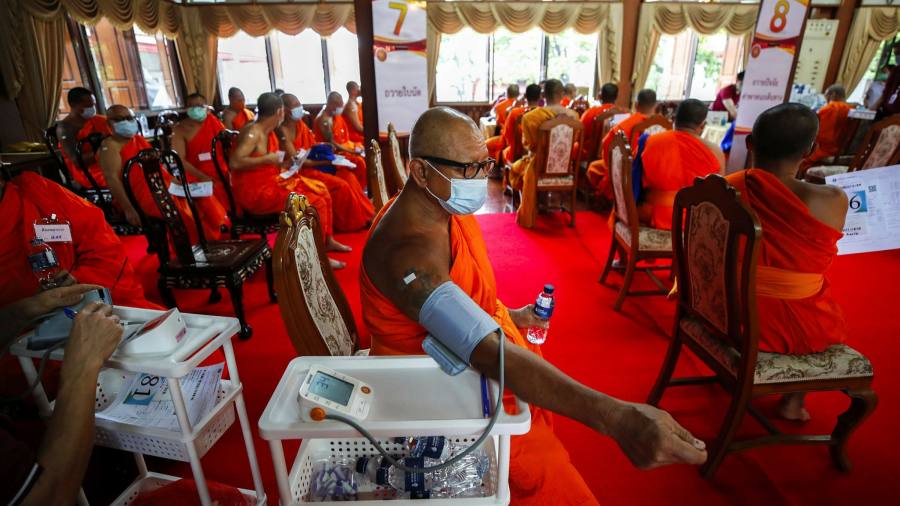Thailand’s prime minister won plaudits for steering the country successfully through the first year of the coronavirus pandemic. But as cases rise and the vaccine rollout falters, big business and ordinary Thais alike have unleashed their anger and frustration at the government.
The criticism has been stoked by the sharpest rise yet in infections in the kingdom, which medical experts have linked to the faster-spreading variant of the virus first identified in the UK.
Thailand’s plan to vaccinate up to 50 per cent of its 70m population this year, and 70 per cent by 2022, has until now been based almost entirely on a single vaccine: the Oxford/ AstraZeneca jab.
The kingdom has ordered 63m doses of the vaccine, most of which are being produced by local company Siam Bioscience, which is owned by billionaire King Maha Vajiralongkorn. However, the locally made AstraZeneca jabs will only be available from June.
Thailand has also imported 2m doses of the Sinovac vaccine. As of Wednesday, Thailand had vaccinated only about 600,000 people, less than 1 per cent of its population, and a lower rate than most of its south-east Asian neighbours.
Thaksin Shinawatra, the exiled former prime minister, stepped in with an offer in an online chat this week to help secure Russian Sputnik V vaccines. Prime minister Prayuth Chan-ocha rejected the overture.
But in the face of growing anger over the delay, the prime minister said that Thailand hoped to secure an additional 35m vaccine doses from “two or three” other producers, without specifying which.
Defending the government’s procurement decisions, Prayuth told reporters this week that they had been made “based on the situation at that time, when we were successful in containing the outbreak”.
Thailand’s powerful business groups, which are normally circumspect to a fault in their public statements, demanded firmer government action this week and offered to help.
Forty companies from the Thai Chamber of Commerce signed a statement saying that the vaccination rollout was proceeding too slowly for the planned reopening of the country to international visitors this year, and that they stood ready to help the government “connect the dots”.
Separately Dhanin Chearavanont, Thailand’s richest businessman and honorary chair of conglomerate Charoen Pokphand, said Prayuth should allow the private sector to import vaccines.
In Wednesday’s announcement, Prayuth said that business had offered to “ease the government’s financial burden” by funding 10m-15m new doses.
“Our vaccine acquisition programme has been abysmal,” said Cod Satrusayang, editor of the Thai Enquirer, an independent news website that has been critical of the government’s vaccination efforts.
“If you compare Thailand to any other country with similar GDP in our region, we are vaccinating at half that rate.”
Thailand’s initial public health response to the pandemic last year had been good, Satrusayang said, thanks to a strong public health system that predated the pandemic. But the government had “taken their foot off the pedal in the past three months”.
Any criticism of Thailand’s vaccination programme is politically sensitive because Siam Bioscience is owned by the king, whose powers and wealth faced a rare public challenge during historic youth-led democracy protests last year.
Thanathorn Juangroongruangkit, Thailand’s leading opposition figure, has been charged under the kingdom’s strict lèse majesté law for questioning the government’s vaccination strategy and what he called the “royal vaccine”.
The law, which was also used to charge several leaders of last year’s protests who are in prison and awaiting trial, carries a maximum 15-year prison sentence.
The pandemic has battered the Thai economy, causing a 6 per cent drop in GDP in 2020 and emptying the crowded beaches and hotels in a country where tourism generates nearly a fifth of economic output.
The Thai government had planned to begin reopening six tourist areas to vaccinated foreign visitors from July 1, led by the tourist island of Phuket under a pilot programme dubbed “Sandbox”.
However, the timeline for the scheme, which is predicated on mass vaccination of local residents, is in doubt because of the sudden rise in cases and strained vaccine supply.
Thailand has reported 46,643 coronavirus cases and 110 deaths from the disease, a lower number than most countries of its size.
However, the number of daily cases topped 1,000 for the first time this month and created a stir after clusters of infections, which included Saksayam Chidchob, the transport minister, were reported at two nightclubs in Thonglor, an upscale neighbourhood of Bangkok.
Follow John Reed on Twitter: @JohnReedwrites


